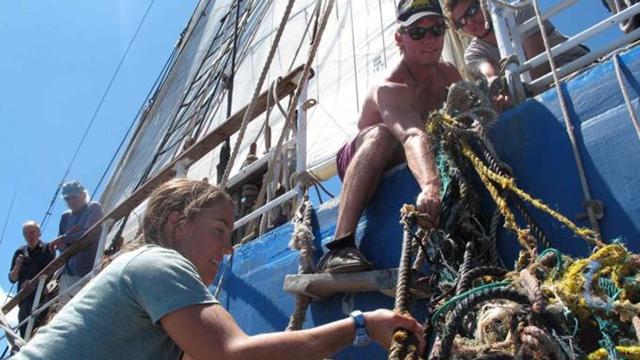
If you listen closely, you can hear the oceans, underwater life, and birds crying. Sometimes they're yelling for help. Plastic is quickly and painfully killing their environment and overall way of life.
If you think I'm exaggerating, watch this heartbreaking trailer for Midway: Message From the Gyre, a forthcoming documentary about Midway Atoll, a collection of three small islands in the North Pacific, where the bodies of tens of thousands of dead baby albatrosses are filled with plastic junk. The islands are more than 2,000 miles (3,219km) from the nearest continent, making it one of the most remote places on earth.
Led by the incredible photographer Chris Jordan, the team behind the film has returned to the island over several years and bore witness to albatrosses dying from starvation, toxicity, and choking caused by human trash. "We walk through the fire of horror and grief, facing the immensity of this tragedy - and our own complicity - head on. The viewer will experience stunning juxtapositions of beauty and horror, destruction and renewal, grief and joy, birth and death, coming out the other side with their heart broken open and their worldview shifted."
In the trailer, Jordan asks, "Do we have the courage to face the realities of our time and allow ourselves to feel deeply enough that it transforms us and our future? Come with me on a journey through the eye of beauty across an ocean of grief and beyond."
If the trailer is any indication of what's to come, the film will be heartbreaking to watch, but if we don't come to terms with what we're doing to the planet, it will die off right before our very eyes. When you look at what's happening in Midway or spend anytime on a beach or in the ocean, it's clear that the painful process has already begun.
Midway Atoll, an unincorporated territory of the United States, is about one-third of the way from Honolulu, Hawaii to Tokyo, Japan, and is located near the apex of the Great Pacific Garbage Patch, the world's largest landfill. When I first heard about the Garbage Patch, which is located between Hawaii and the West Coast and estimated to be roughly twice the size of Rhode Island, I pictured a massive floating garbage dump that could possibly be cleaned up. But because the sun breaks plastic down into tiny pieces and never fully decomposes, the Patch is more like a massive soup bowl of small plastic bits that float just below the surface, making clean up efforts impossible.
The Great Pacific Garbage Patch is just one of five known patches in the world. According to a sobering new study from the Australian Research Council Center of Excellence for Climate System Science, even if everyone in the world stopped littering and putting trash into the ocean, giant garbage patches would continue to grow for hundreds of years.
"There are five known garbage patches in the subtropical oceans between each of the continents. Each contains so much plastic that if you were to drag a net through these areas you would pull up more plastic than biomass," said lead author Erik Van Sebille. In some regions of the North Pacific, there is more weight in plastic than there is in life. That's how bad it is.
The study also points out that if you were to drop a rubber duck in the ocean nearest you, it could end up in any ocean in the world. Watch this video to find out how the Australian researchers used GPS to project the path of plastics in the oceans.
"Garbage from any country can end up in any one of these garbage patches. This tells us that no single country is responsible. Ocean garbage is an international problem that requires an international solution," said Dr Van Sebille.
John Klavitter, Deputy Refuge Manager of Midway Atoll National Wildlife Refuge, is hopeful that the documentary on Midway will create global awareness needed to implement real solutions.
Klavitter has lived on the island for the past 11 years and still feels like he's living in a dream. "The albatross look at you with trusting eyes," he says. "It's still unbelievable 11 years later."
When he made his first trip to Midway in 1992, he saw a few plastic bottle caps. Today, they're the most common item found inside hundreds of thousands of dead albatross. On average, 350,000 albatross chicks hatch every year. Approximately 230,000 leave the island and 120,000 die. It's difficult to verify the cause of death, but he says most die of starvation or dehydration - when their bodies get filled with plastic.
Klavitter not only finds plastic in their stomach, but also in the food they eat. "Ultimately, these plastics have toxins in them," he says. "And it means that we have toxic plastics in our bodies because we're all connected."
So what can we do about this? The plastics industry bears most of the blame, but we are all complicit. We have to stop using so much plastic. Most importantly, we have to pressure the packaging industry to move towards bio-based products. According to Global Industry Analysts, the packaging industry is expected to reach $262bn by 2015. Dead birds, toxic chemicals and dirty beaches do not matter when profits are the ultimate goal.
If we don't act now, Klavitter believes that it will take thousands of years before there is no plastic in the ocean. "We can't afford to wait," he says. "The albatross are teaching us what we're doing to our planet. They're telling us to make changes before it's too late."
Rose Aguilar is the host of Your Call, a daily call-in radio show on KALW in San Francisco. Follow her on Twitter: @roseaguilar.
3 WAYS TO SHOW YOUR SUPPORT
- Log in to post comments















